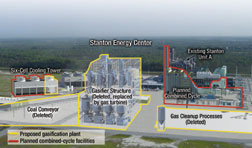... of waste coal, newly mined coal and biomass. Dominion also is planning gas-fired “peaking” capacity and new nuclear units.
Despite the $1.6-billion project’s environment-friendly name, the Virginia City Hybrid Energy Center is facing a barrage of criticism from environmentalists, including Cale Jaffe, staff attorney at the Southern Environmental Law Center, and Josh Tulkin, deputy director of the Chesapeake Climate Action Network.
Jaffe and Tulkin both dispute Dominion’s description of the project as a “clean-coal” facility, noting its high sulfur and nitrogen-oxide emissions and that the plant would annually emit more than 5 million tons of CO2.
| + click to enlarge |
 |
Dominion officials say the plant will be “carbon-capture compatible, meaning that technology to capture carbon dioxide could be added to the station when it becomes commercially available.” Jaffe counters that CFB technology is “not a good fit” for CO2 capture and that CO2-capture equipment would consume up to 30% of the plant’s electric output.
In February, the Sierra Club launched a campaign against coal plants being developed by Dynegy Inc., Houston, in a joint venture with LS Power Group, East Brunswick, N.J. “We hope Dynegy will come to realize that coal plants are a bad investment,” given the likelihood of carbon legislation that will significantly increase the total cost of generating electricity from coal, says Sierra Club spokeswoman Virginia Cramer.
“Banks and Wall Street already are realizing this,” says Cramer, referring to the Feb. 4 announcement by Citi, JPMorgan Chase and Morgan Stanley of “The Carbon Principles,” which are guidelines for lenders to U.S. power companies for “evaluating and addressing carbon risks in the financing of electric power projects.”
On Feb. 22, Westar Energy Inc., Topeka, Kan., issued a new strategic plan that calls “the velocity and magnitude of technological, market and policy change affecting the industry…unprecedented.” It notes, “Just in the last two years, the estimated price of a baseload coal plant has nearly doubled-from about $1,200-$1,500 per kW to as much as $4,400-$2,900 per kW.”
| + click to enlarge |
 Orlando Utilities Commission CO2 worries caused owners to drop the coal-gasification project in favor of a conventional gas turbine with combined cycle. |
Gas prices in the period have ranged from $3.65 per million Btu to $15.41, the report adds. And it asserts that “Concern that there might be a correlation between greenhouse gases and global warming has moved from a polarizing debate to mainstream belief, leading to calls for urgent and fundamental change in energy production and consumption.” The uncertainties about fossil fuels have led the public and policy makers to reconsider nuclear power in a positive light, it adds.
Replacing thousands of megawatts of coal-fired capacity that is either cancelled or facing possible cancellation will not be an easy matter.
“There are few options to replace the canceled coal capacity that was anticipated to come online between 2012 and 2017,” says energy consultant Wood Mackenzie in a report titled, “Coal Plant Cancellations: Time to Panic?” Options include new gas-fired plants, new renewable sources such as wind farms, and energy efficiency.
Gas Pains
The so-called “dash to gas,” however, raises concerns of its own, mostly that it ignores the lessons of recent history. Gas prices have risen sharply since 2004, in large part because of the mass of new gas-fired capacity that came online between the mid-1990s and 2005. There also are long-range concerns about gas supply.
Progress Energy Carolinas, for one, is hedging its bets. To meet its gradual, incremental needs through the next 10 years, the utility is expanding its energy-efficiency offerings and renewables portfolio, and planning new gas-fired plants in North Carolina, including a 157-MW peaking plant in Wayne County that will begin commercial operation in 2009, and a 600-MW combined-cycle plant in Richmond County that will come online in 2011. Longer term, says Progress’ Hughes, “We continue to believe that nuclear represents our best option for baseload power.”
Engineering a Response
Engineers and contractors must be flexible in dealing with the utility industry’s turmoil. For its own staffing, Kansas City-based Black & Veatch seeks to anticipate “one, two or three years in advance, sometimes longer,” what clients will need in terms of engineering and other services, says Ed Walsh, executive vice president and director of business lines. There will continue to be a growing need for generating capacity in the U.S., and the recent softness in the coal-plant market here is leading to an increasing number of gas-fired projects, together with a greater need for engineers to design them, he says.
Further, because Black & Veatch is a global entity, the company also “can absorb some of the cycle swings” such as a slowdown in coal-related work in the US by shifting engineering staff to coal projects overseas, he adds.
Walsh notes that the company also has been expanding its activity in the renewable energy sector, which offers substantial promise for growth.

Post a comment to this article
Report Abusive Comment